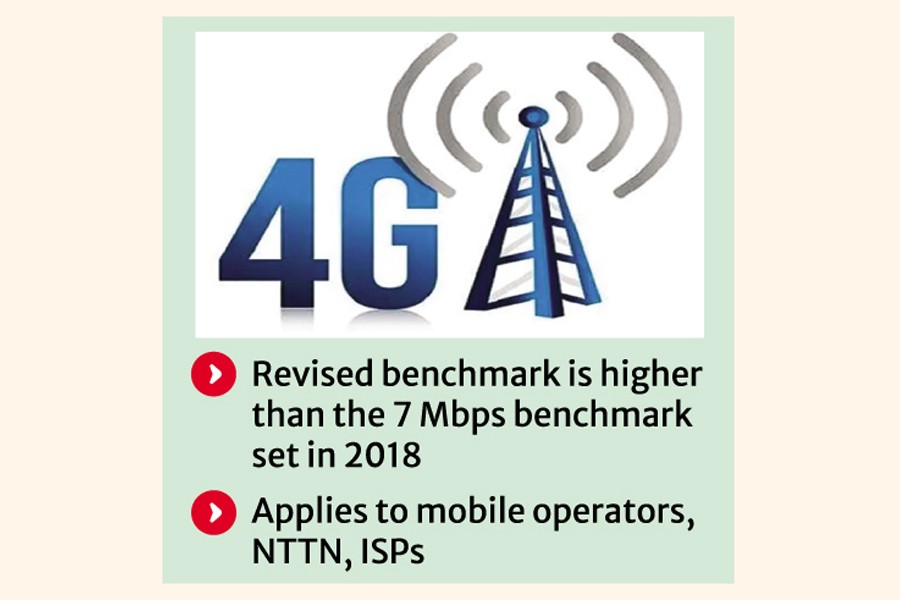
Published :
Updated :

The government has introduced a new Quality of Service (QoS) benchmark for the country's telecom sector, setting a minimum download speed of 10 megabits per second (Mbps) for 4G internet services to improve mobile network performance.
The revised benchmark, approved at a recent Bangladesh Telecommunication Regulatory Commission (BTRC) meeting, replaces the 7 Mbps standard set in 2018.
The new requirement is lower than the 15 Mbps proposed in a draft policy earlier this year and below the speed figure the regulator has often cited since 2022. The minimum upload speed has been fixed at 2.0 Mbps, compared with 4.0 Mbps suggested in the draft.
For the first time, the QoS framework will cover not only mobile operators but also National Telecommunication Transmission Network (NTTN) operators and internet service providers (ISPs).
The framework comes into effect from September 1, with BTRC carrying out monthly network performance reviews and health checks.
The framework sets stricter rules for both voice and data services. Call setup success rates must remain at 99 per cent nationwide and at least 98 per cent at district and upazila levels.
Call drop rates on 2G networks must not exceed 1.0 per cent nationally and 1.5 per cent locally, while 4G networks must achieve a 99 per cent connection success rate nationwide and 98.5 per cent at district level.
Compliance will be monitored through drive tests, where operators must achieve at least 98 per cent success in call setups and keep automated call drops below 2.0 per cent. The voice-over-LTE (VoLTE) user experience index has been fixed at a minimum of 3.5.
For internet speed, operators must deliver a minimum 10 Mbps download and 2.0 Mbps upload for 4G services. Average user download speeds must not fall below 3.5 Mbps nationwide and 2.5 Mbps at district level.
The QoS obligations also extend to customer care. At least 90 per cent of calls to service centres must be answered within 40 seconds, and all calls within 90 seconds. Non-network complaints must be resolved within 28 days.
BTRC said operators will have to submit monthly reports on three key indicators -- accessibility, retainability, and network integrity. Any breach of the new standards will be treated as an offence under the Bangladesh Telecommunication Regulation Act, 2001, and may incur administrative fines.
Commenting on the reform, Faiz Ahmad Taiyeb, special assistant to the Chief Adviser for the Ministry of Posts, Telecommunications and Information Technology, said the move would ensure greater transparency and accountability in the sector.
"Mandatory reporting will put pressure on operators to maintain quality, especially in rural and suburban areas where complaints about poor coverage and frequent call drops are still common," he wrote in a Facebook post.
Association of Mobile Telecom Operators of Bangladesh (AMTOB) Secretary General Mohammad Zulfikar said, "Mobile operators have always been committed to ensuring uninterrupted and high-quality services for subscribers. Developing a QoS guideline is essential -- a process that has been underway for the past few years."
He added, "In discussions on this matter, we have shared our views and recommendations, taking into account the realities of the telecom sector, the existing tax structure, customer expectations, and the balance between investment and revenue. Our dialogue with BTRC is still ongoing. We have not yet received the final guideline, but once we do, we will be able to provide our feedback."
bdsmile@gmail.com


 For all latest news, follow The Financial Express Google News channel.
For all latest news, follow The Financial Express Google News channel.